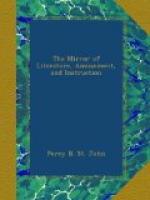* * * * *
VALE OF TEMPE.
Dr. Clarke says, “The boasted Vale of Tempe, is a defile; it is something like Matlock, but wilder; more savage than Salvator Rosa, and with nothing of Claude. I cannot tell why the ancients made such a fuss about it; perhaps because half of them never saw it, and took its character from hearsay; the other half, like mankind every where, stupidly admiring what is said to be admirable. It is like a crack in a great wall, at the bottom of which is a river, sometimes inundated, sometimes dry; the passage narrow, the sides craggy, bare, lofty and perpendicular; its whole length not above a mile.”
* * * * *
THEATRES.
We find the following sensible observations in a recent work:—
“In the reigns of Elizabeth and James, the golden age of the English drama, London was not a tenth part of its present sire, and it contained seventeen theatres. At present (1808) there are but two; more would succeed, and indeed more are wanted; but these have obtained exclusive privileges. Old people say the acting was better in their younger days, because there were more schools for actors; and the theatres being smaller, the natural voice could be heard, and the natural expression of the features seen, and therefore rant and distortion were unnecessary. They, however, who remember no other generation of actors than the present, will not be persuaded that there has ever been one more perfect. Be this as it may, all are agreed that the drama itself has woefully degenerated, though it is the only species of literary labour which is well paid; they are agreed also as to the cause of this degeneracy, attributing it to the prodigious size of the theatres; the finer tones of passion cannot be discriminated, nor the finer movements of the countenance perceived from the front, hardly from the middle of the house. Authors, therefore, substitute what is here called broad farce for genuine comedy; their jests are made intelligible by grimace, or by that sort of mechanical wit which can be seen; comedy is made up of trick, and tragedy of processions, pageants, battles, and explosions.”




